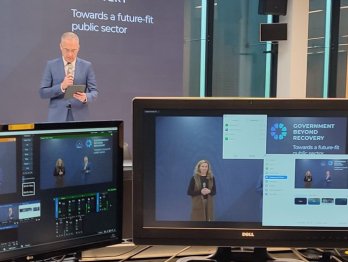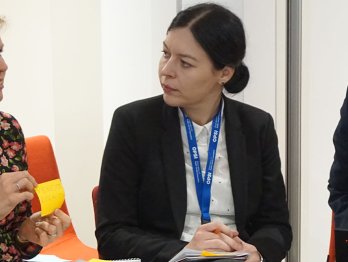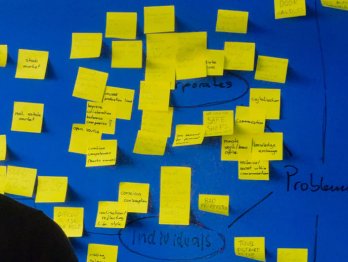COVID-19: Innovative responses update #1

As we have already seen, the coronavirus crisis has resulted in governments implementing a range of innovative responses. In this update, we’d like to take a quick look at some of the additional innovative initiatives that we’ve seen over the past week, including in the open government and digital government arenas.
Recently we issued a call-out for people to identify any innovative, digital and open government solutions and inspiration on how individuals and organisations across the globe are responding to the crisis. We’d like to thank all of those of you who have helped share the call (including those who have partnered with us to spread the call further, such as the Centre for Public Impact). We encourage everyone to continue sharing, as we know there are more innovative responses happening all the time.
So far, over 50 innovative responses have been submitted. We expect there will be a lot to learn after the crisis, including about the nature of public sector innovation and open and digital government, but in the meantime we think it is important to share what we learn as we learn it. Thus, we intend to provide regular updates about the innovative responses occurring as long as it seems appropriate. These updates will also feed into the more comprehensive pieces of work being done by the OECD as a whole, and more targeted pieces from us at OPSI about what we can learn about the nature of public sector innovation from this crisis.
First update
So what can we learn from the 50+ initiatives that we have seen thus far? The below is a quick look at some of the patterns being seen so far:
- Hackathons: There have been a range of hackathons occurring or being planned to create new responses, including from Estonia, Finland, Lithuania and Germany, and from the broader community (see Codevid-19 pandemic hackathon and AI for Mankind). Some of the creations from the Estonian hackathon can already be seen in practice (e.g. a chatbot and a test/symptom checker)
- Other open calls and challenges: In Italy ‘Innova per l’Italia’ has been launched, a broad call to actors across society who can contribute to national response to the crisis. In addition, OpenIDEO has launched a call on ‘how might we rapidly inform and empower communities around the world to stay safe and healthy during the COVID-19 outbreak?’ Thirdly, the EU has issued a Call for Proposals for SMEs to source coronavirus related innovative solutions from the private sector
- Streamlining existing processes and service delivery: There is work to make procurement processes more open (e.g. in Ukraine), quick mobilisation to shift public service work to working from home (e.g. Portugal), and changing service transactions to online (e.g. creating online business registrations in Benin)
- Making expertise and comparative information more easily available: For instance, the Harvard Kennedy School Ash Center for Democratic Governance and Innovation has launched a COVID-19 Public Sector Resources platform to help identify relevant resources and lessons for public administrations, Bloomberg Philanthropies is virtually convening experts in public health and city leadership for US city governments through their Coronavirus Local Response Initiative, the UK Ministry of Housing, Communities and Local Government is hosting virtual Coronavirus meetings every week, the Global Digital Health Network is curating digital solutions, the Blavatnik School of Government has created the COVID-19 Government Response Tracker to compare government responses, and the US Federation of American Scientists has worked with others to create a ‘Ask a scientist’ platform
- Improving public communications: the Australian Government has launched a new app and WhatsApp chat feature to help keep citizens informed about the crisis (as has the UK), Brazil has a new app, and the World Health Organisation, UNIECEF and the UNDP have collaborated on a WhatsApp Coronavirus Information Hub. Meanwhile, the Mexican Government created a new superhero character ‘Susana Distancia’ to emphasise and encourage social distancing, and France has provided a consolidated data point for all official data on the progression of the epidemic
- Infection control or tracking measures: There have been a number of measures around tracking the contacts of people known to be infected with the virus, including Singapore’s employing of contact tracers to follow-up those potentially exposed, the COVID-19 symptom tracker allowing UK users to self-report symptoms to provide intelligence about the possible spread of the disease, and the analysis of anonymised mobile phone data in Switzerland to understand the extent to which the population is complying with social distancing recommendations
- Social solidarity and ‘caremongering’: There have been a range of initiatives arising, often at a grassroots level, to demonstrate social solidarity and to mobilise untapped resources. For instance, in Canada there have been a number of ‘caremongering’ groups created to allow people to more easily offer help to others within their communities. Workers in the Communication Workers Union at the Royal Mail Postal Service in the UK have volunteered to be an additional emergency service. A Swedish University has offered basic medical training to workers of the SAS airline who are currently out of work, so that they can assist during the crisis. Additionally, the Italian Government has created a digital solidarity call to allow entities that wish to provide digital products or services for free to the Italian population during the period of the crisis and lockdown.
To repeat, this is only a quick overview of some of the patterns we’re seeing from the examples submitted thus far, and it is not exhaustive. We apologise if we’ve misinterpreted any of these examples or if there are specifics we’re missing, as this is a fast-moving area and there are going to be details we haven’t completely captured (if so, let us know!).
‘The proof of the pudding is in the eating’
(We don’t know if these are good, bad or indifferent and probably won’t until much later, because that’s innovation)
The challenge with many innovative initiatives such as those mentioned is that it is often not easy to tell whether something was effective until after the fact. Therefore we are not vouching for (or discounting) any of the innovative initiatives that have been recorded. Our aim is to help collect and share cases so that others can see what is happening and draw inspiration from them, or sometimes even perhaps just copying them.
If you know of others, please add them in
We ask for your help in continuing to add innovative initiatives to the coronavirus crisis, as well as disseminating the call. This helps us to gather data to inform our research and support governments and share ideas and replicable solutions with others around the world.









